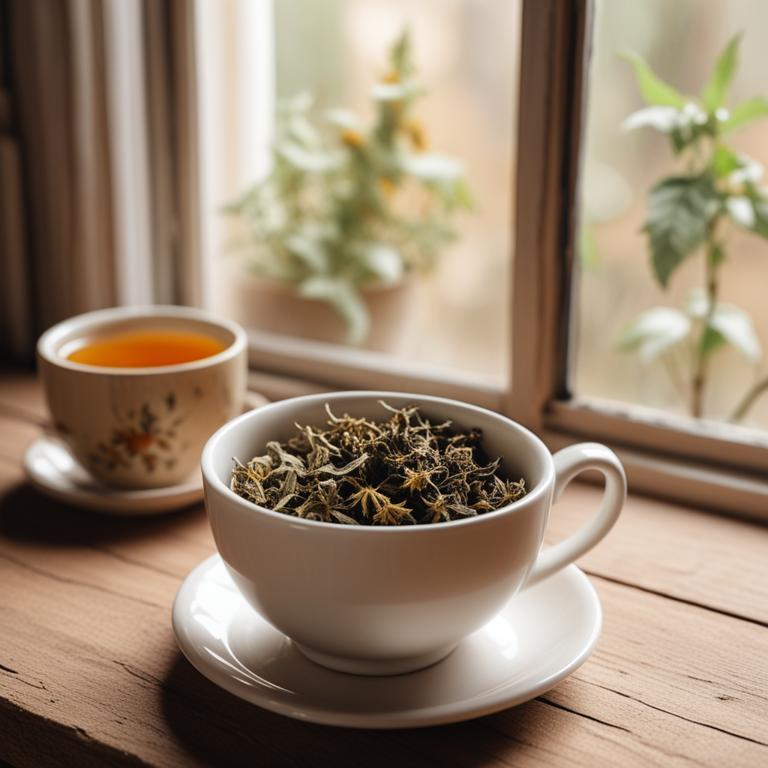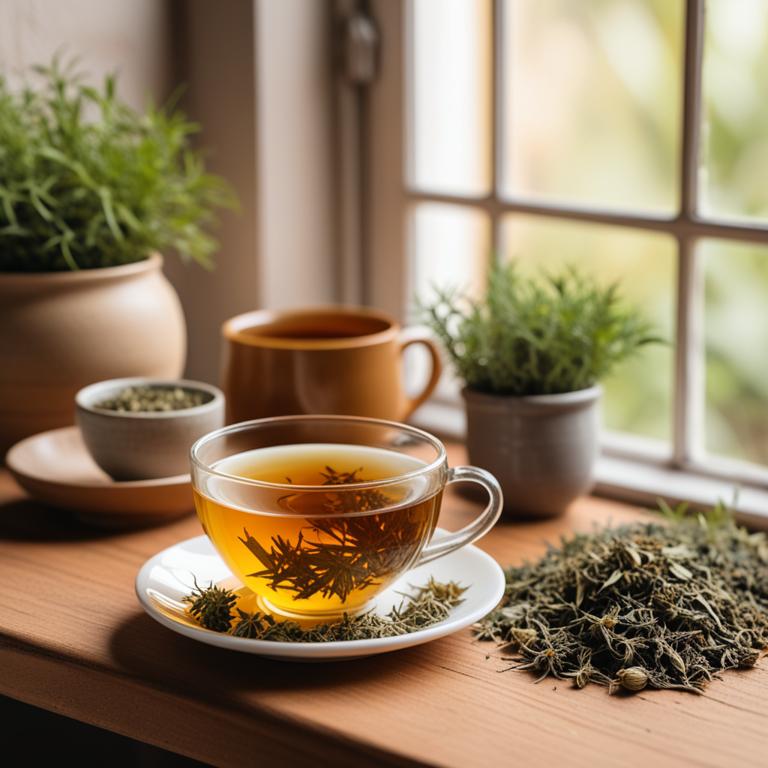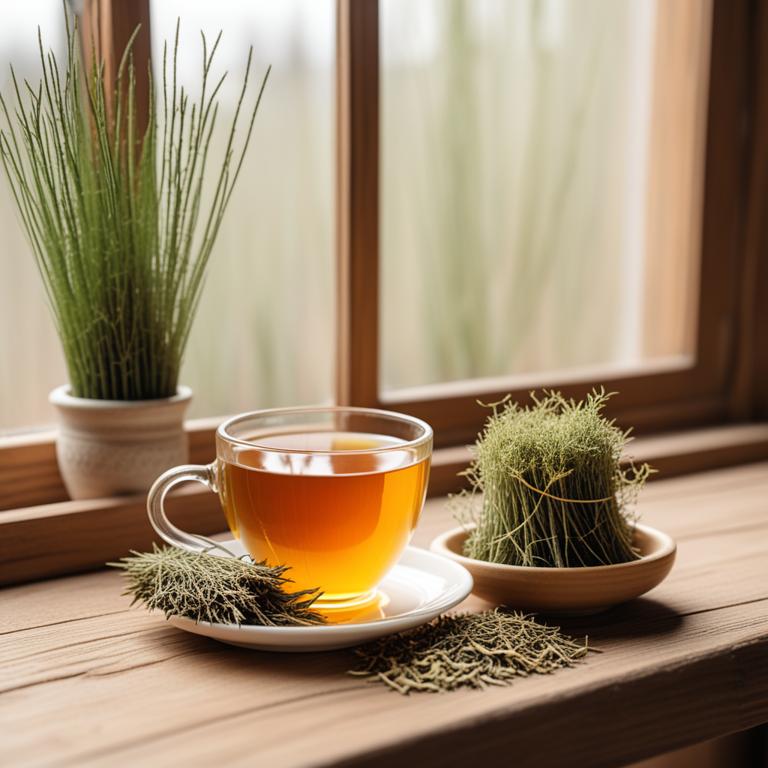7 Best Herbal Teas For Benign Prostatic Hypertrophy

Herbal teas for Benign prostatic hypertrophy are a type of herbal remedy used to alleviate the symptoms of an enlarged prostate, a non-cancerous condition that affects millions of men worldwide.
These herbal teas can treat this ailment by reducing inflammation, improving urinary flow, and relaxing the muscles in the prostate gland, thus providing relief from frequent urination and other uncomfortable symptoms.
Some popular herbal teas used to treat Benign prostatic hypertrophy include Saw Palmetto, which blocks the conversion of testosterone to dihydrotestosterone, a hormone that contributes to prostate enlargement; Pygeum, which helps to reduce inflammation and improve prostate function; and Urinary System tea, which includes herbs like Juniper berries and Parsley to increase urine production and reduce swelling; and Cinnamon tea, which has anti-inflammatory properties to reduce swelling and improve blood flow to the prostate.
Additionally, other herbal teas such as Dandelion root, Green tea, and Turmeric tea have also been found to be beneficial in reducing symptoms associated with Benign prostatic hypertrophy.
Related Study
According to the review of herbal therapies in "The Annals of pharmacotherapy", teas containing herbs such as Serenoa repens, Pygeum africanum, Urtica dioica radix, and Cucurbita peponis semen may be beneficial in treating some symptoms of benign prostatic hypertrophy, particularly for stages I and II.
Below there's a list of the 7 best herbal teas for benign prostatic hypertrophy.
Table of Contents
Also, you may be interested in...
Today Free Bonus!
The Ultimate Herb Drying Checklist
(For Long-Lasting Powerful Medicinal Effect)
How to easily dry herbs that don't mold and that keep their strong medicinal power for more than 1 year.
1. Serenoa repens teas

Serenoa repens teas, also known as saw palmetto teas, have been traditionally used to treat benign prostatic hypertrophy (BPH), a condition characterized by an enlarged prostate gland.
The anti-inflammatory and antioxidant properties of this herbal preparation help to alleviate symptoms associated with BPH, including urinary frequency and nocturia.
The bioactive constituents of Serenoa repens, including phytosterols, fatty acids, and terpenoids, have been shown to inhibit the conversion of testosterone to dihydrotestosterone (DHT), a hormone that contributes to prostate enlargement.
By reducing DHT levels and alleviating inflammation, Serenoa repens teas provide a natural and effective treatment option for BPH, improving urinary flow and overall quality of life.
Related Study
According to the study in Clinical therapeutics, Serenoa repens teas for benign prostatic hypertrophy are useful in treatment, but they do not act by changing hormone levels in the body.
Recipe:
- Gather 1 cup of dried Serenoa repens (Saw Palmetto) leaves and flowers. You can buy this at a health food store or online.
- Combine the dried Serenoa repens with 1 cup of boiling water in a teapot or mug.
- Steep the mixture for 5-7 minutes, then strain the liquid into another cup using a tea strainer or cheesecloth.
- Add honey or lemon to taste, if desired. Some people prefer their tea sweet or sour.
- Drink 1-2 cups of the tea per day, as directed by a healthcare professional or as needed for symptom relief.
Serenoa repens teas can be used to treat benign prostatic hypertrophy, but potential side effects include gastrointestinal issues such as diarrhea, nausea, and stomach cramps.
Precautions to take when using Serenoa repens teas include avoiding intake with other medications, especially blood thinners and certain antidepressants, and being cautious of interactions with other herbal supplements, as well as monitoring for allergic reactions such as hives or itching.
2. Curcuma longa teas

Curcuma longa teas have been explored as a potential natural remedy for treating benign prostatic hypertrophy (BPH), a common condition affecting older men.
The bioactive constituents of Curcuma longa, including curcuminoids, have anti-inflammatory and antioxidant properties that help to alleviate symptoms of BPH.
These compounds may inhibit the growth of prostate cells and reduce inflammation in the prostate gland, thus providing relief from urinary retention and other associated symptoms.
The benefits of using Curcuma longa teas to treat BPH include its natural and non-invasive approach, reduced risk of side effects, and potential improvement in overall prostate health.
Related Study
According to the provided study, Curcuma longa teas for benign prostatic hypertrophy show potential benefits as certain phytocompounds, including curcumin, have been reported to be useful for the management of BPH.
Recipe:
- Gather 1 cup of water and 1/2 teaspoon of dried Curcuma longa root powder.
- Boil the water in a pot.
- Turn off the heat and add the Curcuma longa root powder to the water.
- Steep for 5-7 minutes, then strain the liquid into a cup.
- Drink the tea 2-3 times a day, preferably after meals, for relief from benign prostatic hypertrophy symptoms.
Curcuma longa teas can potentially alleviate symptoms of benign prostatic hypertrophy, but may cause side effects such as stomach upset, nausea, diarrhea, and headache in some individuals.
Precautions when using Curcuma longa teas for this ailment include monitoring blood sugar levels, as it may lower blood sugar, and being cautious when taking anticoagulant medications, as it may increase the risk of bleeding.
Curcuma Longa Tea on Amazon
Pure Ceylon Turmeric Brew - 100% Organic Ceylon Turmeric Tea Bags (40 Sachets - pack of 2 – 20 COUNT PER BOX)
Disclaimer: We earn a commission if you click this link and make a purchase at no additional cost to you.
3. Zingiber officinale teas

Zingiber officinale teas, derived from the rhizomes of the ginger plant, have been traditionally used to treat benign prostatic hypertrophy (BPH) due to their anti-inflammatory, antioxidant, and spasmolytic properties.
These properties help to reduce inflammation and oxidative stress in the prostate gland, thereby alleviating symptoms such as urinary frequency, urgency, and nocturia associated with BPH.
The bioactive constituents of Zingiber officinale teas, including gingerols and shogaols, have been shown to relax smooth muscle cells in the prostate gland, improving urine flow and reducing symptoms of BPH.
The benefits of using Zingiber officinale teas to treat BPH include reduced symptoms, improved quality of life, and a natural alternative to pharmaceutical medications.
Recipe:
- Gather 2 tablespoons of dried Zingiber officinale (Ginger root) and 1 cup of boiling water.
- Add the 2 tablespoons of dried Zingiber officinale to a cup.
- Pour 1 cup of boiling water over the ginger root.
- Let the mixture steep for 5-7 minutes.
- Strain the tea and drink it 2-3 times a day for relief from benign prostatic hypertrophy symptoms.
Zingiber officinale teas can be used to treat benign prostatic hypertrophy, but possible side effects may include gastrointestinal discomfort, such as nausea, diarrhea, and stomach upset, as well as potential interactions with blood thinning medications.
Precautions should be taken when consuming Zingiber officinale teas for this condition, including avoiding excessive consumption, which may exacerbate stomach issues and potentially worsen symptoms of benign prostatic hypertrophy.
Zingiber Officinale Tea on Amazon
FGO Organic Ginger Tea, 100 Count, Eco-Conscious Tea Bags, Caffeine Free, Packaging May Vary (Pack of 1)
Disclaimer: We earn a commission if you click this link and make a purchase at no additional cost to you.
4. Ginkgo biloba teas

Ginkgo biloba teas have been traditionally used to treat benign prostatic hypertrophy (BPH) due to their anti-inflammatory, antioxidant, and vasodilatory properties.
The bioactive constituents of Ginkgo biloba, including flavonoids and terpenoids, help to improve blood flow to the prostate gland, reducing inflammation and swelling associated with BPH.
By improving microcirculation and reducing oxidative stress, Ginkgo biloba teas may help alleviate symptoms of BPH, such as urinary frequency and weak urine flow.
The benefits of using Ginkgo biloba teas to treat BPH include reduced risk of prostate enlargement, improved urinary function, and a decrease in the need for surgical interventions.
Recipe:
- Gather 1 teaspoon of dried Ginkgo biloba leaves and 1 cup of boiling water.
- Steep the Ginkgo biloba leaves in the boiling water for 5-7 minutes.
- Strain the tea into a cup to remove the Ginkgo biloba leaves.
- Add 1 tablespoon of honey to the tea for taste, if desired.
- Drink the tea 2-3 times a day for relief from benign prostatic hypertrophy symptoms.
Ginkgo biloba teas can be used to treat the symptoms of benign prostatic hypertrophy, but possible side effects may include gastrointestinal upset, allergic reactions, and interactions with medications such as blood thinners and diabetes medications.
Precautions to take when using Ginkgo biloba teas for this ailment include starting with low doses, monitoring blood sugar levels, and being aware of potential interactions with other herbal supplements and medications to avoid exacerbating the condition.
Ginkgo Biloba Tea on Amazon
Tai Chi Think Sharp Energizing Tea (Ginseng Ginkgo Biloba) 12 Bags
Disclaimer: We earn a commission if you click this link and make a purchase at no additional cost to you.
5. Urtica dioica teas

Urtica dioica teas, derived from the leaves of the stinging nettle plant, have been used to treat benign prostatic hypertrophy (BPH) due to their anti-inflammatory and diuretic properties.
The herbal preparation's ability to inhibit the conversion of testosterone to dihydrotestosterone (DHT), a hormone that contributes to BPH, helps to alleviate symptoms such as enlarged prostate and urinary frequency.
Bioactive constituents like flavonoids, phenolic acids, and alkaloids in Urtica dioica teas may help to reduce the size of the prostate gland and improve urine flow, providing relief from BPH symptoms.
The benefits of using Urtica dioica teas to treat BPH include reduced prostate size, improved urinary function, and a decrease in the risk of complications associated with BPH.
Related Study
According to "Planta medica", Urtica dioica teas for benign prostatic hypertrophy showed the 20% methanolic extract to be the most effective with a 51.4% inhibition of induced growth.
Recipe:
- Gather 1 cup of fresh Urtica dioica leaves and flowers, or 2 tablespoons of dried leaves and flowers.
- Combine the Urtica dioica with 1 cup of boiling water in a saucepan.
- Reduce the heat and let it simmer for 5-7 minutes.
- Strain the mixture into a cup and discard the solids.
- Drink 1 cup of the tea, 2-3 times a day, as needed.
Urtica dioica teas can be used to treat benign prostatic hypertrophy, but possible side effects include dizziness, nausea, and stomach upset in some individuals.
Precautions when using this herbal preparation include avoiding it if you have allergies to plants in the nettle family, as well as being cautious when combining it with other medications due to potential interactions.
Urtica Dioica Tea on Amazon
The Republic of Tea — Organic Nettle SuperHerb Tea Tin, 36 Herbal Tea Bags, Naturally Caffeine-Free
Disclaimer: We earn a commission if you click this link and make a purchase at no additional cost to you.
6. Equisetum arvense teas

Equisetum arvense teas have been traditionally used to treat benign prostatic hypertrophy (BPH) due to their diuretic, anti-inflammatory, and antioxidant properties.
These properties help to alleviate the symptoms of BPH by reducing inflammation and swelling in the prostate gland, improving urinary flow, and relieving symptoms such as frequent urination and nocturia.
The bioactive constituents of Equisetum arvense teas, including flavonoids, alkaloids, and saponins, are responsible for their therapeutic effects, which help to inhibit the growth of prostate cells and reduce the size of the prostate gland.
The benefits of using Equisetum arvense teas to treat BPH include reduced symptoms, improved urinary function, and a decrease in the risk of complications associated with BPH, making it a promising herbal remedy for this condition.
Recipe:
- Gather 1 cup of fresh Equisetum arvense (horsetail) leaves and stems.
- Wash the horsetail in cold water, then pat it dry.
- Use a coffee grinder or herb grinder to finely chop 2 tablespoons of the dried or 1 cup of fresh horsetail.
- Steep 1 teaspoon of the chopped horsetail in 1 cup of boiling water for 5-10 minutes.
- Strain and drink 1-2 cups of the tea, 2-3 times a day for desired effect.
Equisetum arvense teas can be used to treat benign prostatic hypertrophy, but its use may be associated with possible side effects such as diarrhea, stomach upset, and allergic reactions in some individuals.
Precautions should be taken when using this herbal preparation, including monitoring for interactions with other medications and adjusting the dosage to avoid exacerbating urinary retention issues.
7. Rosmarinus officinalis teas

Rosmarinus officinalis teas have been explored as a potential treatment for benign prostatic hypertrophy (BPH) due to their diuretic and antioxidant properties, which help to alleviate symptoms associated with this condition.
The herbal preparation's ability to reduce inflammation and improve urinary flow makes it a promising natural remedy for BPH sufferers.
The bioactive constituents of Rosmarinus officinalis, including carnosic acid and rosmarinic acid, have been shown to possess anti-inflammatory and antioxidant activities that contribute to its therapeutic effects on BPH.
Regular consumption of Rosmarinus officinalis teas may help to alleviate symptoms of BPH, including urinary frequency, nocturia, and decreased urine flow, offering a natural alternative to conventional treatments.
Recipe:
- Gather 1 cup of fresh Rosmarinus officinalis leaves or 1 teaspoon of dried leaves.
- Boil 1 cup of water in a pot and let it cool for 5 minutes.
- Add the Rosmarinus officinalis leaves to the water and let it steep for 5-7 minutes.
- Strain the tea into a cup using a tea strainer or cheesecloth.
- Drink 1 cup of the tea 2-3 times a day for 2-3 weeks to help alleviate benign prostatic hypertrophy symptoms.
Rosmarinus officinalis teas can be used to treat benign prostatic hypertrophy, but possible side effects may include gastrointestinal upset, such as nausea and stomach cramps, as well as interactions with other medications, particularly blood thinners and antacids.
Precautions to take when using this herbal preparation include starting with small doses, monitoring blood pressure and heart rate, and being cautious when combining it with other herbal remedies or medications that may have synergistic effects.
Rosmarinus Officinalis Tea on Amazon
Palm Beach Medicinal Herbs - Rosemary Tea - Pure Herbal Tea Series, 30ct
Disclaimer: We earn a commission if you click this link and make a purchase at no additional cost to you.